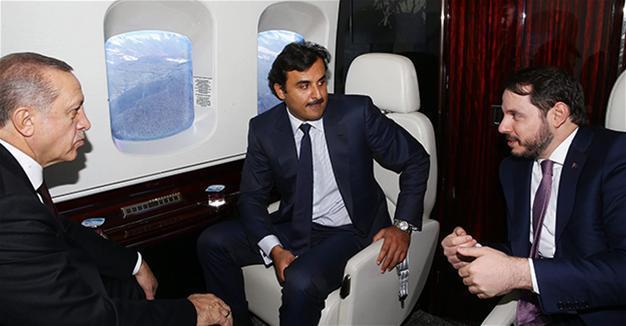Turkey and Qatar in the tangled geopolitics of the Middle East
William Armstrong - william.armstrong@hdn.com.tr

Turkish President Recep Tayyip Erdoğan (L), Qatari Emir Sheikh Tamim bin Hamad al-Thani (C) and Turkish Energy Minister Berat Albayrak (R) convene aboad the presidential jet during al-Thani's visit to Turkey in 2016.
‘Turkey and Qatar in the Tangled Geopolitics of the Middle East’ by Birol Başkan (Palgrave, 147 pages, £38)
The diplomatic siege of Qatar by Saudi Arabia-led Arab Gulf states has cemented ties between Turkey and the small but superrich petro-state. The Ankara-Doha alliance is among the most significant stories of recent years and it has come under renewed focus with the Saudi-led campaign. The two countries have
increasingly solid diplomatic, economic, and security relations – often putting them at odds with neighboring Gulf states.

Amid the current crisis, many people are frantically brushing up on the past and present of Turkey-Qatar relations. Some will be turning to “Turkey and Qatar in the Tangled Geopolitics of the Middle East” by Birol Başkan, an Assistant Professor at the Georgetown University School of Foreign Service in Qatar. The book is a useful, though rather dry, primer. It aims to answer the question of how and why Ankara and Doha have developed such a special relationship in recent years.
The book focuses on the post-9/11 landscape, when Turkey and Qatar were able to become more influential actors in the Middle East. They benefited from the escalating sectarian rivalry between Saudi Arabia and Iran, wary of Shiite Iran’s rising influence but also preferring not to fall completely into the orbit of Saudi Arabia. “By benefiting from the leadership vacuum in the Arab World against a rising Iran, but themselves avoiding entrapment in the Saudi-Iran rivalry that revived and intensified in the second half of the 2000s, Turkey and Qatar could emerge as proactive players in the Middle East,” writes Başkan. They raised their profile through arbitration efforts in a number of conflicts, including an attempted initiative with Brazil on Iran’s nuclear program in 2010 and mediation efforts between Israel and Hamas.
Saudi Arabia and the United Arab Emirates remained cautious but tolerant of the rising profile of Turkey and Qatar through the 2000s. But as protests against autocratic regimes swept across the region in the Arab Spring of 2011, Ankara and Doha’s support of Muslim Brotherhood-linked forces posed a challenge to Arab Gulf security. This support became increasingly energetic with the Arab Spring, unsettling regimes that wanted to maintain the status quo.
Unlike other Middle Eastern states, Turkey and Qatar saw little threat in the rise of the Muslim Brotherhood, as both had developed relations with it throughout the 2000s. In Egypt, after the removal of Hosni Mubarak, Ankara and Doha became major financial and political supporters of the Brotherhood-backed President Muhammed Mursi. When Mursi himself was overthrown in 2013 after a year in office, Turkey and Qatar became isolated and faced a regional backlash, which only pushed them closer together.
Başkan describes how all this happened. But his book’s sections on the war in Syria - where Turkey, Qatar, Saudi Arabia (both as states and through private initiatives) supported a mélange of opposition and jihadi factions – could benefit from more detail. Başkan touches on the war, but he could certainly expand on how its shifting alliances have reflected relations between Turkey, Qatar and the other Gulf Arab states. Another weak point is the
lack of attention to developing economic ties between the two countries, which has informed the steps of both regimes as their alliance tightens.
The recent campaign against Qatar can be seen as the culmination of a long-brewing storm. Doha is paying the price for challenging the status quo. Turkish officials have trumpeted their efforts as mediators, with Foreign Minister Mevlüt Çavuşoğlu in Riyadh last week to this end. But there can be little doubt about where the Turkish regime sees its interests as lying. As in previous years, the Turkey-Qatar alliance is being strengthened by adversity. Time will tell whether that will be enough to weather the storm.
* Follow the Turkey Book Talk podcast via iTunes here, Stitcher here, Podbean here, or Facebook here.

 Amid the current crisis, many people are frantically brushing up on the past and present of Turkey-Qatar relations. Some will be turning to “Turkey and Qatar in the Tangled Geopolitics of the Middle East” by Birol Başkan, an Assistant Professor at the Georgetown University School of Foreign Service in Qatar. The book is a useful, though rather dry, primer. It aims to answer the question of how and why Ankara and Doha have developed such a special relationship in recent years.
Amid the current crisis, many people are frantically brushing up on the past and present of Turkey-Qatar relations. Some will be turning to “Turkey and Qatar in the Tangled Geopolitics of the Middle East” by Birol Başkan, an Assistant Professor at the Georgetown University School of Foreign Service in Qatar. The book is a useful, though rather dry, primer. It aims to answer the question of how and why Ankara and Doha have developed such a special relationship in recent years.